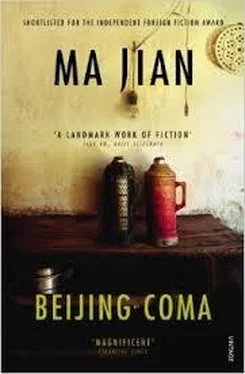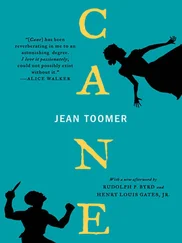‘Dai Wei, when you get to university, you must focus on your political education. You must do all you can to gain Party membership.’
I didn’t bother to argue with her. I wasn’t particularly interested in my father’s past. The country had changed now. My father’s foreign connections may have ruined his life, but they had saved mine. Thanks to him, I was now about to go to university.
Dai Ru said goodbye to me and went off to school. He was fifteen, and as tall as I had been when I was detained by the police.
Your flesh and spirit are still alive, buried inside the coffin of your skin.
Southern University was on the outskirts of Guangzhou City. The campus was ten times larger than my secondary school. Mosquitoes danced through the dense leaves and sprawling branches of hundred-year-old trees.
Our dormitories were housed in two former hospital blocks that had belonged to the old Military Medical Academy. The two-storey, adjacent blocks were connected on the first floor by an open passageway which was probably built so that patients could be wheeled easily from one ward to the next. This passageway was the only place in the campus where you could enjoy a cool breeze. Everywhere else — in the dorms, classrooms, cafeterias and basketball courts — the air was hot and humid.
In April, I would begin to sweat, and for the next six months would remain drenched in perspiration from head to toe. The heat steamed my energy away. I understood why southerners are so small and thin. All the students suffered from the heat, gulping at the air like goldfish, but students from the north, like me, suffered the most. During lectures, the professors had even more sweat on their foreheads than us. At mealtimes, our sweat would drip into our bowls, and we’d swallow it down together with the soup and rice.
At dusk, the few female students would emerge clean and dry from their dorms, having taken showers and combed their black hair. They wouldn’t play basketball, rush off to the library, or read books under the lamplight like the boys. Instead, they would slowly stroll back and forth along the open passageway, walking in pairs, holding a handkerchief or a fan in their hands. The sight of them strolling along was as refreshing as a gust of cool air.
I felt like a fish swimming in water. I gradually grew accustomed to living in the sea of perspiration. Like any other animal, I had to adapt to my new environment. My pores enlarged so as to release more moisture. My feet, which had previously always been clean and dry, were now constantly drenched in fetid sweat.
The science block stood in a windless spot at the foot of a steep hill. In the afternoon, the windows and whitewashed walls became scorched by the sun. We grew drowsy as the electric fan on the ceiling circulated the hot air through the room. I spent my first term sweltering in that southern furnace, studying Darwin’s theory of evolution.
I started reading The Book of Mountains and Seas again. As a child, I’d loved this survey of ancient China for its magical descriptions of gods and monsters. But now I began to read it for the interesting scientific data it provided. Over two thousand years ago, the anonymous author of the book set out to explore China’s landscapes and myths. He travelled to the four cardinal points of the empire, and to the wildernesses beyond, and reported back on what he saw. Although modern scholars believe the book to be a work of the imagination, I was convinced that it was based on real experience. I decided that, after I graduated, I would follow in the footsteps of the unknown author, and compare the plants and animals I found to those described in his text. I wanted to identify the strange species he listed, and investigate their evolution. I suppose The Book of Mountains and Seas had become my favourite book.
Only at university did it occur to me that I could perhaps make a name for myself as a scientist, and no longer be brushed aside as merely the son of a dead rightist. As it turned out, my father’s persecution and my arrest at fifteen helped raise my status among my classmates, who were also impressed that I’d peddled pornographic magazines on the black market. For the first time in my life, I felt a sense of self-worth.
We were a generation with empty minds. We thirsted for knowledge. Now that China had opened its doors to the West, we devoured every scrap of information that blew in. China had emerged from the catastrophe of the Cultural Revolution, and we were eager to build our country up again. We were fired by a sense of mission.
In my first term at university, the Hemingway craze was soon superseded by a craze for Van Gogh, which was fanned by the recent Chinese publication of his fictionalised biography, Lust for Life . Van Gogh’s madness and creative individuality taught us our first great lesson in life, which is: believe in yourself. Everyone copied out quotations from the book and passed them around.
During a dissection class at the start of the second term, I met a medical student from Hong Kong called A-Mei.
Her face was smooth and almost expressionless, although sometimes she looked as though she were secretly smiling to herself. Her eyes were as clear as glass and as calm as water in a well. She was very different from Lulu.
Her mother was a professional folk singer, and when I told her that my mother was a singer too, we struck up a friendship. She was born in Zhongshan County in Guangdong Province. Her family had emigrated to Hong Kong when she was one.
I bumped into her one day in the library. She was wearing a white dress, and her clean black hair was coiled into a neat bun. She knew that if we wanted to read a newly published book, we had to submit a reservation card, then wait for months. So she said to me, ‘ Lust for Life isn’t selling very well in Hong Kong. I could easily get my hands on a copy. I’ll buy you one next time I go.’
After that, she often brought back books for me which were hard to get hold of in mainland China.
Although your cells and nerves are no longer interacting properly, the signal transmission mechanism is still functioning, allowing physical traces of past events to reappear in your mind.
‘Fuck you! Of course I know who Freud is! I read about him ages ago.’
Wang Fei was sitting on the bunk above me, dangling his legs over the edge. The pale skin of his calves was covered with fine, black hairs. His toes, which hung like fleshy hooks at the end of his feet, clenched whenever he spoke. He was born in Wanxian County in Sichuan Province. There was a rumour that he came from a peasant family, but he claimed he had an urban residence permit, and that his parents owned a colour television. He spoke with a thick Sichuan accent, and whenever he got worked up about something, he’d slip back into his local dialect. Like me, he felt great anger about the injustices of the Cultural Revolution, and he enjoyed speculating on the inside story of Lin Biao’s conflicts with Mao’s wife, Jiang Qing.
‘Tell me which country Freud was from then!’ Mou Sen replied, unconvinced. He ran his eyes down the index of the book in his hands and read out, ‘The hat as a symbol of the male genitals… Being run over as a symbol of sexual intercourse… The male organ symbolised by persons and the female by a landscape…’
That was the day I first heard of Freud, his book The Interpretation of Dreams and the terms ‘sexual repression’ and the ‘unconscious mind’.
‘That sounds interesting! Let me have a look!’ Wang Fei lowered himself off his bunk and plonked his foot on my bed.
If Mou Sen wanted to read something, that meant it was good. He had the largest collection of books on our floor of the dorm block. They were stacked up, two books deep, against the wall next to his bed. When he acquired new books and couldn’t find space for them next to the wall, he’d stuff them under his pillow, or under the folded quilt by his feet. I never saw him without a book in his hands. His father had been a writer, and, like mine, had been denounced as a rightist and confined in a labour camp for twenty years. After his father was released, he forced Mou Sen to major in science, arguing that literature was a dangerous subject, but this didn’t dampen Mou Sen’s voracious appetite for novels and poetry. Mou Sen’s great-great-grandfather had been a famous scholar during the Qing Dynasty, and had been granted the honour of flying outside his home a flag stamped with the emperor’s seal.
Читать дальше












